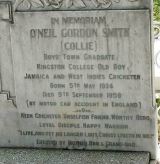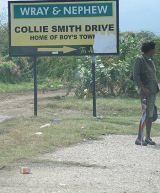Never another like Collie
Siddhartha Vaidyanathan visits the resting place of Collie Smith
|
|

|
When Sobers devotes an entire chapter in his book, Cricket Crusader, to a fellow cricketer, you realise he must have been special. In the chapter titled 'Collie', Sobers wrote: "He had the heart of a giant, an unquenchable ecstasy of spirit, a joyous nature and unmatchable zest for living - and for cricket." The performances show Collie to be special: at 21, in 1954-55, he scored centuries in consecutive games against Australia on his first-class and Test debut respectively; and at 24 he produced a hundred in his first appearance against England, during the course of which he hit a six off Jim Laker which broke the tiles on the ladies' balcony over long-on.
According to a few who saw Collie the "Mighty Mouse", he was a "more than useful" offspinner, modelling himself on Laker; an "exceptional" fielder; and an "awesome batsman", one who attacked with a dash comparable to Sobers. More importantly, he played a carefree brand of cricket - his first scoring shot in England was a six - and always believed that sportsmen needed to entertain. But Collie's most significant achievement was to inspire a whole generation of young West Indians, and make them believe that dreams can be realised.
The area where Collie grew up - in and around Trenchtown - was, and remains, one of the embattled neighbourhoods in Kingston. It's an area that even the locals prefer to avoid considering the rampant levels of violence and corruption. As one enters the area, the desperation is palpable. Shabbily dressed youngsters demand money, saying they haven't had anything to eat in the last few days. Riffraffs threaten, trying to bully you into submission. Luckily, our guide, Lyndel Wright, Collie's youngest brother who grew up in these parts, manages to divert the danger with his firm talking. Wright terms the Boys' Town region as the "Soweto of Jamaica", but recalls the township's heyday, when it was actually the pride of the country, when it produced heroes like Bob Marley, who played football for the local club, and Collie.
In the 1940s, Hugh Sherlock, the priest who wrote Jamaica's national anthem, decided to start a school, a cricket club and a football club in Boys' Town, mainly to engage the disenchanted community in some constructive activity. "Without Hugh, we would have all definitely gone astray," says Gladstone Robertson, a contemporary of Collie's and someone who went on to play cricket for Jamaica. "He helped keep us all occupied, helped us realise that dreams can materialise, inspired us by producing a hero like Collie." Collie was the first, and remains the only, Boys' Town cricketer who went on to play for West Indies. He embodied the good side of Boys' Town - humility, vitality, persistence - and brought cheer to an embittered society.
|
|

|
Alas, unbefitting as it may sound, the Collie Smith Drive is one of the most dangerous streets in Kingston today. The Boys' Town cricket team, which was once a feeder club for the Jamaican national side, languishes at the bottom of the pile. Taxi drivers refuse to go to to Boys' Town, adding that though they are ashamed, they have no choice. Wright sums it up best: "Boys' Town needs more Hugh Sherlocks, needs more heroes like Collie." He recalls the day around 30,000 people thronged the streets, mourning the death of their famous son. He also recalls the lift that Collie gave to the community, who could walk with their heads held high, aspiring to the greatness that Collie achieved.
In a quiet corner of Maypen Cemetery, the biggest of its kind in the Caribbean, lies Collie's gravestone, a cricketing shrine even today. The sad part is that you're usually advised, for your own safety, to not venture in the region.
This article appears Siddhartha Vaidyanathan's Tour Diaries, pubished daily on Cricinfo during the West Indies v India series. Click here to read more.Siddhartha Vaidyanathan is staff writer of Cricinfo